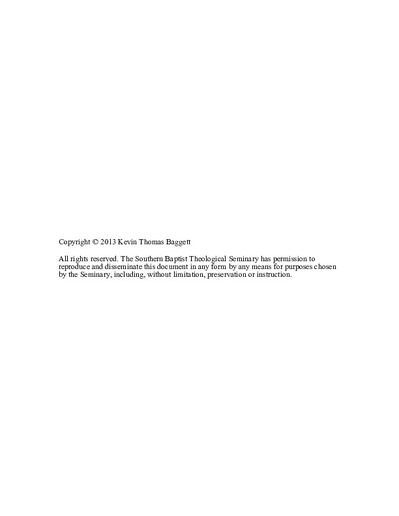| dc.contributor.advisor | Sills, M. David | |
| dc.contributor.author | Baggett, Kevin Thomas | |
| dc.date.accessioned | 2013-12-30T20:47:01Z | |
| dc.date.available | 2016-06-07T14:40:46Z | |
| dc.date.issued | 2013-12-30 | |
| dc.identifier.uri | http://hdl.handle.net/10392/4512 | |
| dc.description.abstract | This dissertation examines the urban missiology of Roger S. Greenway. The thesis is the urban missiology of Greenway should inform the ministries of urban missiologists today. This dissertation answers four questions: How has Greenway's life and theology shaped his urban missiology? What is Greenway's urban church planting strategy? How has Greenway's understanding of holistic ministry enhanced his church planting strategy? What role does theological education and urban training centers have in his urban missiology? If urban missiologists hope to avoid the mistakes of the past and lay a firm foundation for the future, they should seek to learn from the urban missiology of Roger S. Greenway.
Chapter 1 emphasizes the importance of urban missions in a rapidly urbanizing world. The chapter also introduces the research questions and the urban missiological thought of Roger Greenway. A brief overview of Roger Greenway's life and ministry is presented to demonstrate the importance of his work in relation to urban missiology.
Chapter 2 contains a sketch of Roger Greenway's life and theological beliefs. The chapter considers the effects of his Reformed theological background on his urban missiology. Greenway's theology impacts every aspect of his urban missiology.
Chapter 3 outlines Roger Greenway's church planting strategy. The chapter
examines how Greenway's church planting strategy serves as the central piece of Greenway's overall urban missiology. The influence of Donald McGavran is evident in Greenway's urban church planting strategy.
Chapter 4 explains Greenway's understanding and application of holistic ministry. Greenway believes that word and deed ministries must be infused with one another in order to complete the mission of the church.
Chapter 5 delves into Greenway's theological education methodology and how he applied that methodology in the urban context. Greenway believed theological and missiological training should be contextualized into the urban context.
Chapter 6 concludes with a summary of Greenway's urban missiology. The chapter also offers ideas for further research. The dissertation closes by offering insights gleaned from Greenway's urban missiology. | en_US |
| dc.subject.lcsh | City missions | en_US |
| dc.subject.lcsh | Church development, New | en_US |
| dc.subject.lcsh | City churches | en_US |
| dc.subject.lcsh | Cities and towns--Religious aspects--Christianity | en_US |
| dc.title | "Win the City, Win the World": The Urban Missiology of Roger S. Greenway | en_US |
| dc.type | Electronic project | en_US |
| dc.type | Text | en_US |
| dc.publisher.institution | Southern Baptist Theological Seminary | en_US |

